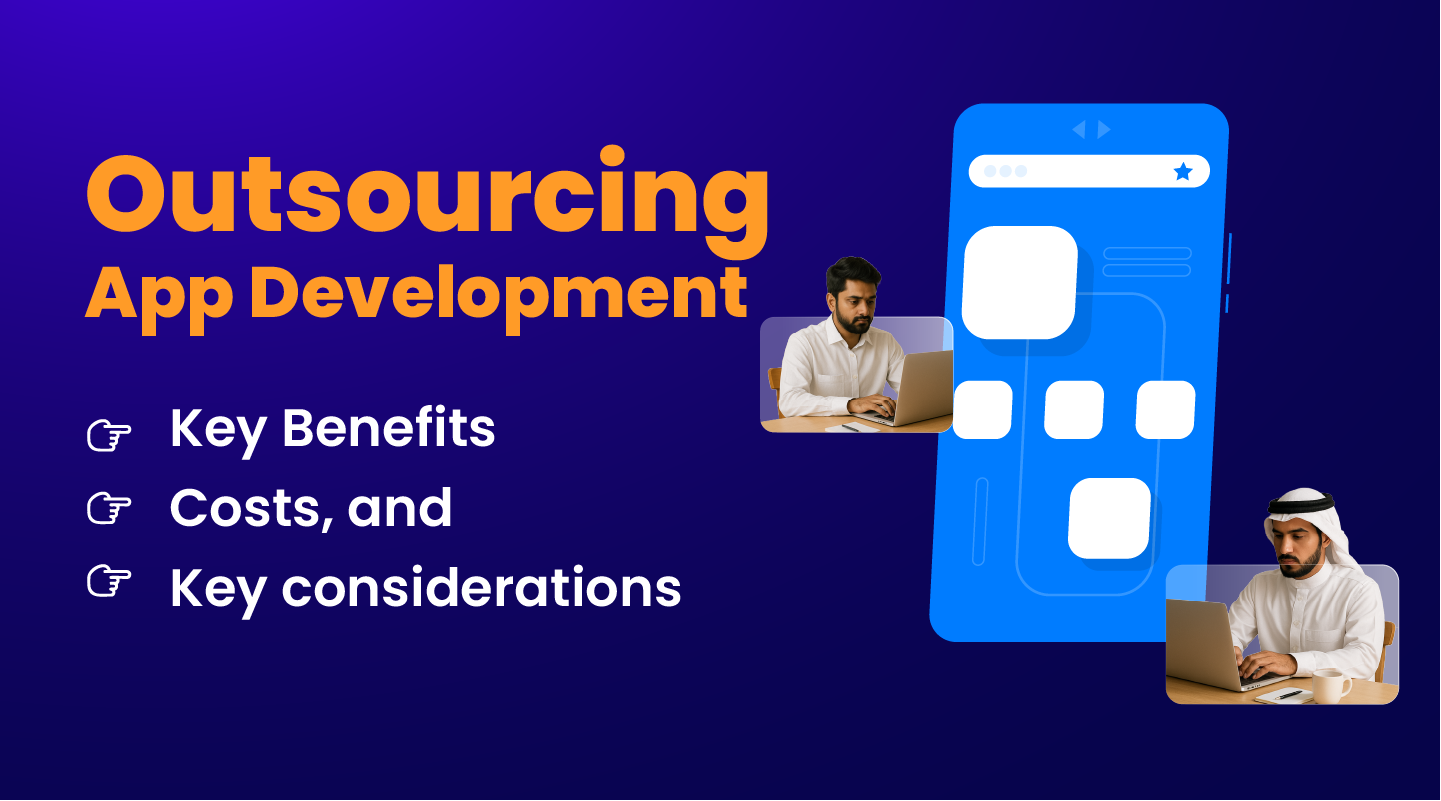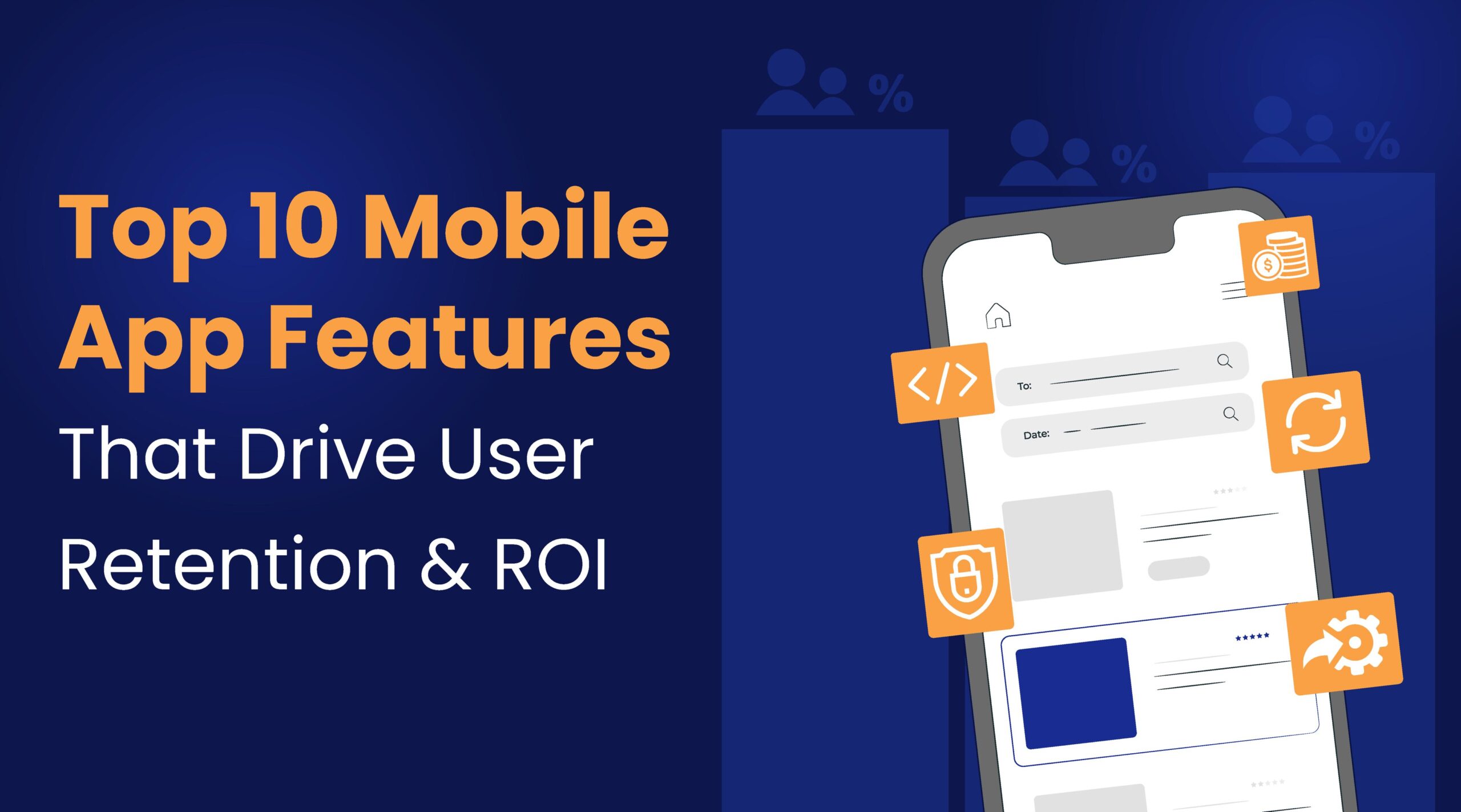Contents
- 1 At a Glance: Outsourcing App Development in 2025
- 2 Introduction: Why Businesses Choose to Outsource App Development
- 3 Key Benefits of Outsourcing Mobile App Development
- 4 Cost of Outsourcing App Development: 2025 GCC Benchmarks
- 5 Challenges of Outsourcing App Development (& solutions we have used at Competenza)
- 6 How to Outsource App Development Without Risk
- 7 How to Select the Perfect Partner to Outsource Your App Development in the Middle East
- 8 How Competenza Helps Middle East Businesses Outsource App Development Efficiently
- 9 Emerging Trends in App Development Outsourcing
- 10 Conclusion: Why Outsourcing App Development Works
- 11 FAQs
At a Glance: Outsourcing App Development in 2025
- 60% of organizations outsource app development to access specialized talent and reduce costs
- Businesses turn to app development outsourcing to rapidly scale their digital capabilities without long-term overheads or internal hiring delays.
- Modern outsourcing partners offer flexible delivery setups from dedicated teams to staff augmentation, tailored to your needs.
- Outsourcing can lower development expenses by up to 50%, especially for startups and SMEs managing limited budgets.
- The IT outsourcing market is projected to surpass USD 1 trillion by 2033, signaling growing enterprise reliance on external tech expertise.
Introduction: Why Businesses Choose to Outsource App Development
Checking hourly weather updates around your location or counting calories of your breakfast, we have an app for everything and every industry—be it real estate, healthcare, banking, edtech, or retail.
The iOS App Store launched in 2008 with 500 apps. Today we have 4 million apps in the world.
Whether you’re building a customer-facing mobile app, internal operations tool, or B2B digital platform, having the right technical team is critical.
However, with high demand for skilled mobile developers across Dubai, Abu Dhabi, Riyadh, and other major GCC cities, they often face a shortage of fully staffed mobile app development teams.
By choosing to outsource, they gain accelerated access to global talent pools, including outsourced app development experts skilled in both iOS and Android development.
This approach supports faster time-to-market for MVPs and digital products, reduces overheads, and offers flexibility for startups, SMEs, and large enterprises alike.
In this guide, we’ll break down everything business leaders in the Middle East region need to know before outsourcing app development—key benefits, cost considerations, potential pitfalls, and how to find the right team to get your product live faster and smarter.
Key Benefits of Outsourcing Mobile App Development
In markets like the Middle East where in-house tech talent can be hard to hire and scale. Outsourcing app development offers a range of strategic advantages.
Here are top 5 benefits of mobile app development outsourcing:
1. Access to Specialized Expertise:
Outsourcing app development gives businesses access to a global talent pool of developers who have deep experience across mobile platforms (iOS, Android), modern frameworks (React Native, Flutter, Xamarin), and industry-specific solutions including fintech, healthcare, e-commerce, and enterprise applications.
- Native iOS development (Swift, Objective-C)
- Android development (Kotlin, Java)
- Cross-platform solutions (React Native, Flutter)
- Backend development (Node.js, Python, PHP, .NET)
- Cloud architecture (AWS, Microsoft Azure, Google Cloud)
- UI/UX design and mobile optimization
- Quality assurance and automated testing
- DevOps and deployment automation
2. Faster Development and Launch:
With established agile development processes and ready-to-deploy teams. outsourcing partners help reduce time-to-market with pre-built frameworks, streamlined onboarding, distributed teams, and other repeatable approaches allow companies to accelerate release cycles.
- Immediate project initiation (1-2 weeks vs 2-6 months for hiring)
- Parallel development workflows and specialized team roles
- Proven development frameworks and reusable components
- Streamlined testing and deployment processes
- Faster iteration cycles and feature releases
3. Cost Efficiency and Predictable Pricing:
- No long-term salary commitments or employee benefits
- Reduced infrastructure and software licensing costs
- Elimination of recruitment and onboarding expenses
- Predictable project budgets with fixed-price or time-and-materials models
- Access to enterprise-grade development tools and platforms
4. Quality Assurance and Risk Mitigation:
- Automated testing frameworks and continuous integration
- Code review processes and technical documentation
- Security audits and vulnerability assessments
- Performance optimization and load testing
- Compliance with industry standards and regulations
5. Focus on Core Business Objectives:
- Leadership focus on business strategy and market expansion
- Sales and marketing teams concentrate on customer acquisition
- Product managers focus on user experience and feature planning
- Reduced technical management overhead for non-technical founders
- Faster pivot capabilities based on market feedback
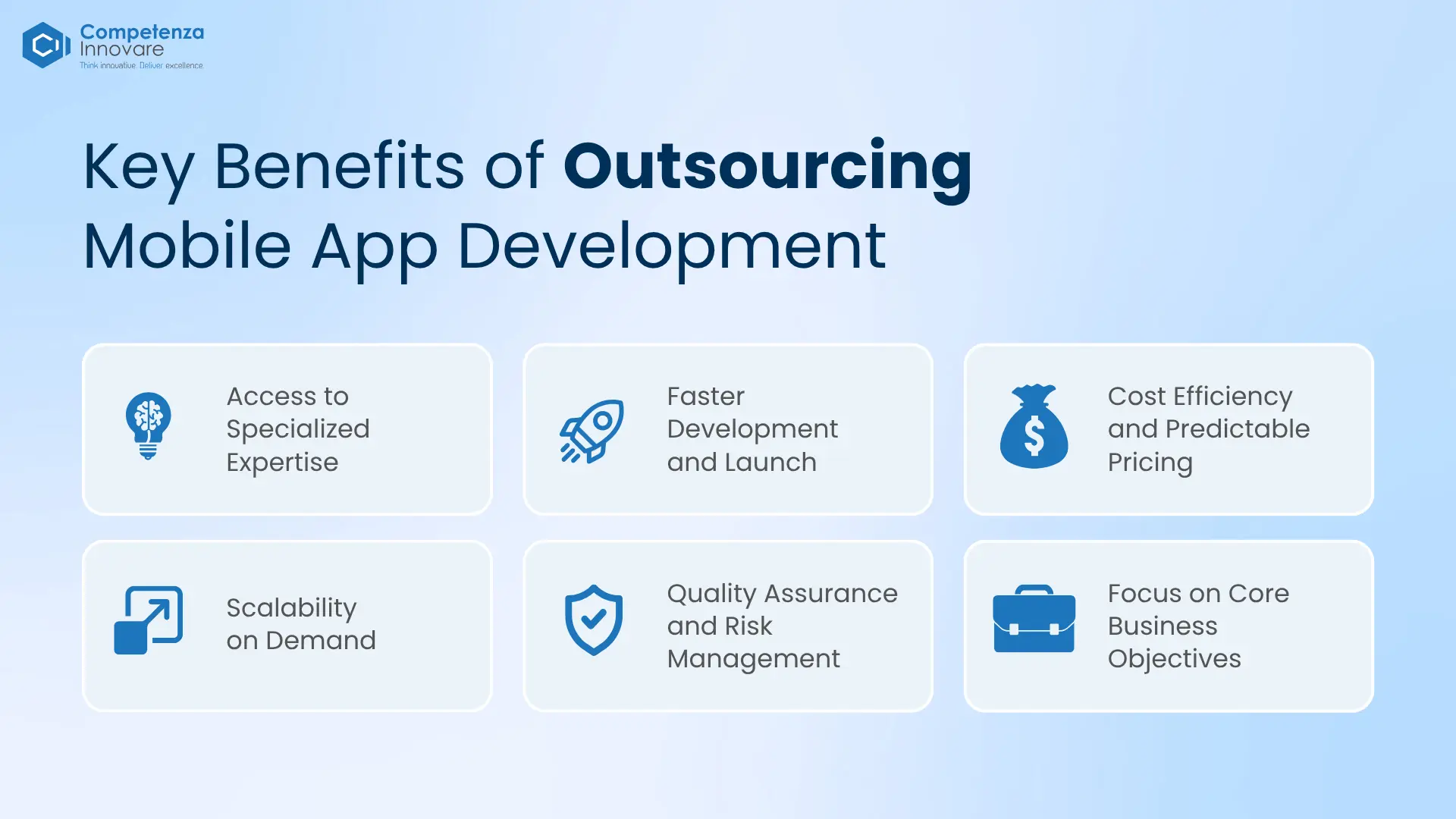
Cost of Outsourcing App Development: 2025 GCC Benchmarks
Outsourcing mobile app development can significantly reduce overall development costs for businesses in the UAE, KSA, and across the GCC while allowing them to tap into global tech expertise.
But to make the most of it, let’s understand where the costs arise and how outsourcing (where distributed teams are deployed) changes the equation.
Key factors that affect the mobile app development costs-
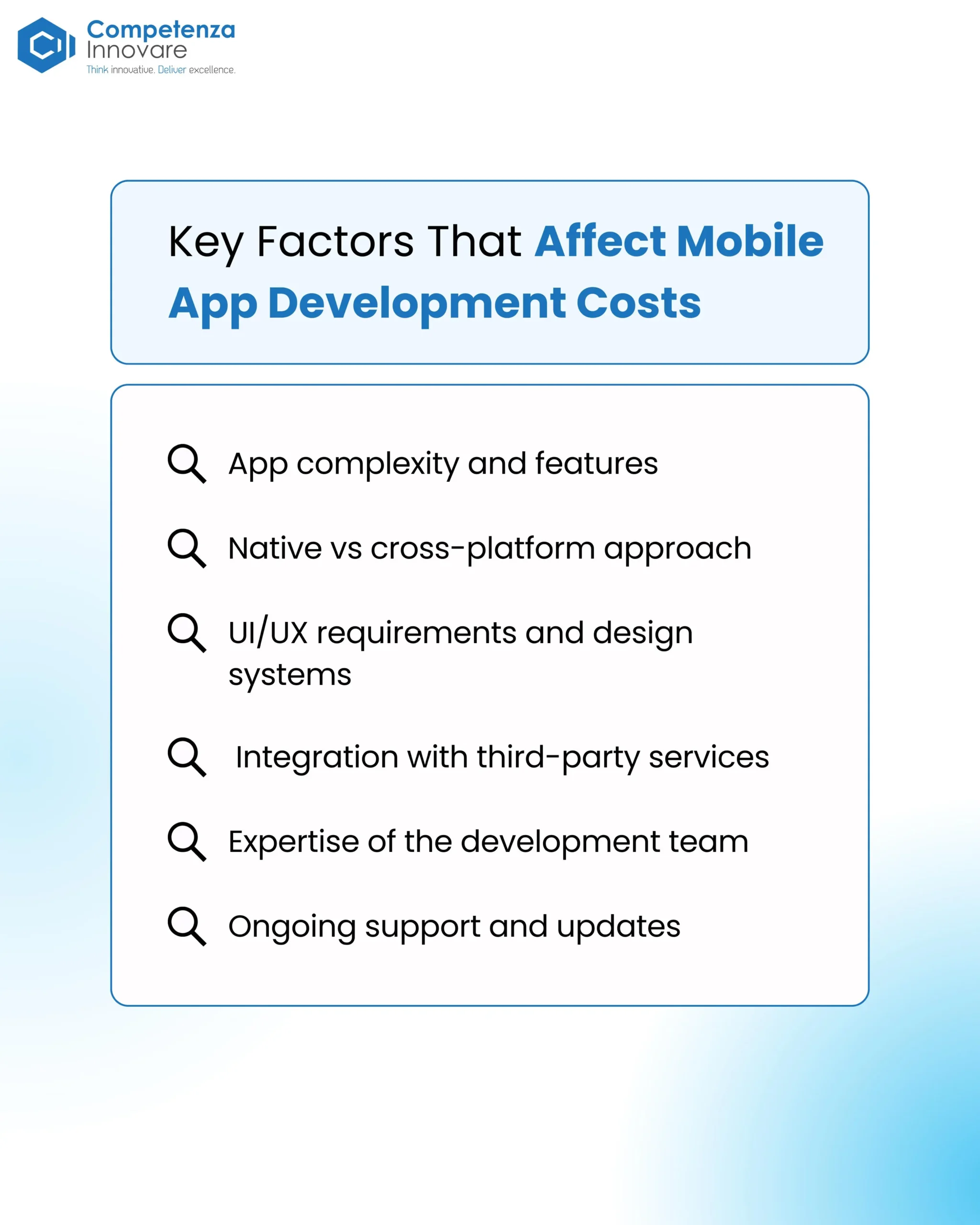
Cost Comparison of In-House vs Outsourced Resources for Mobile App Development
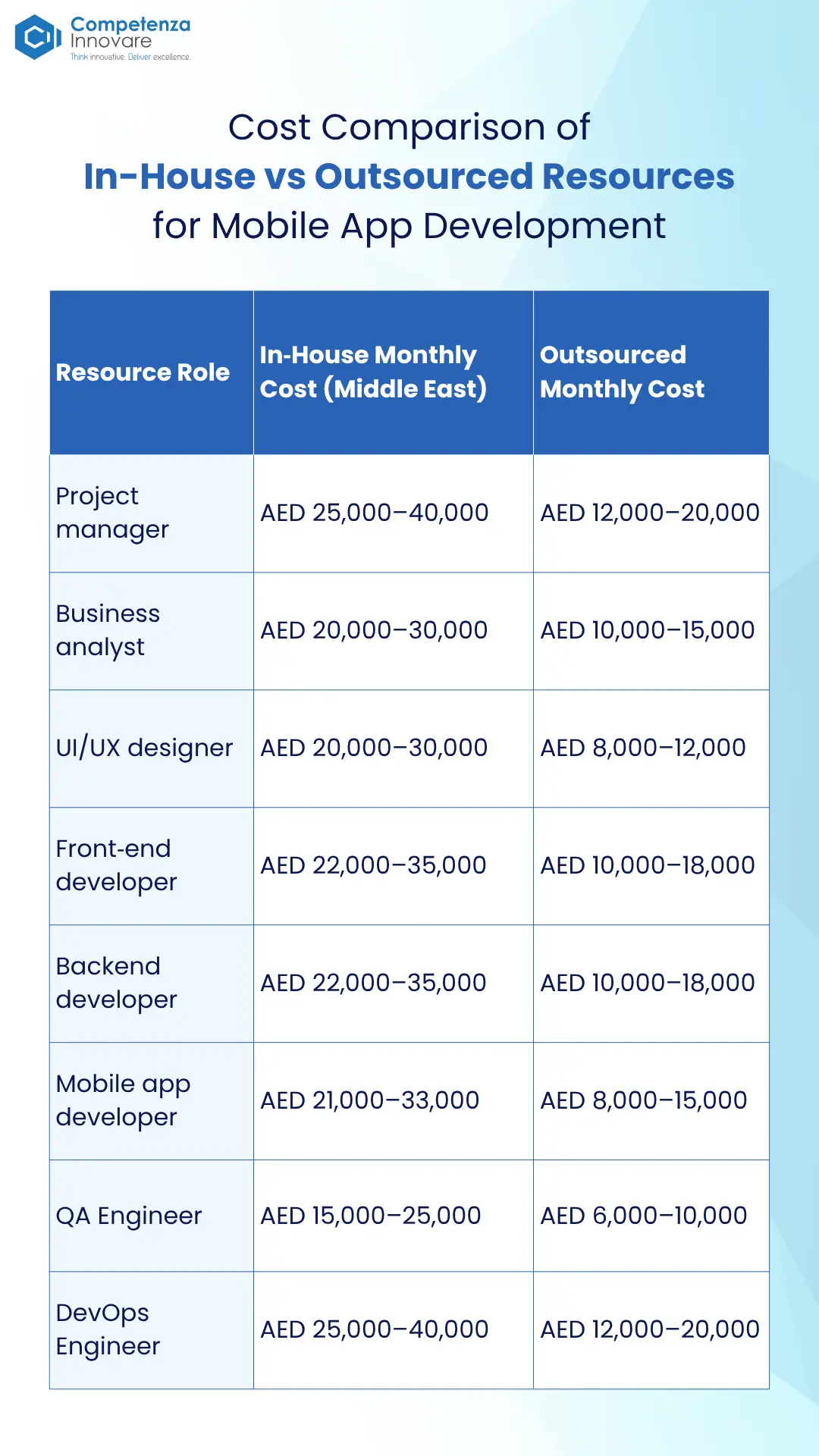
In-house vs Outsourced App Development: Comparative Overview
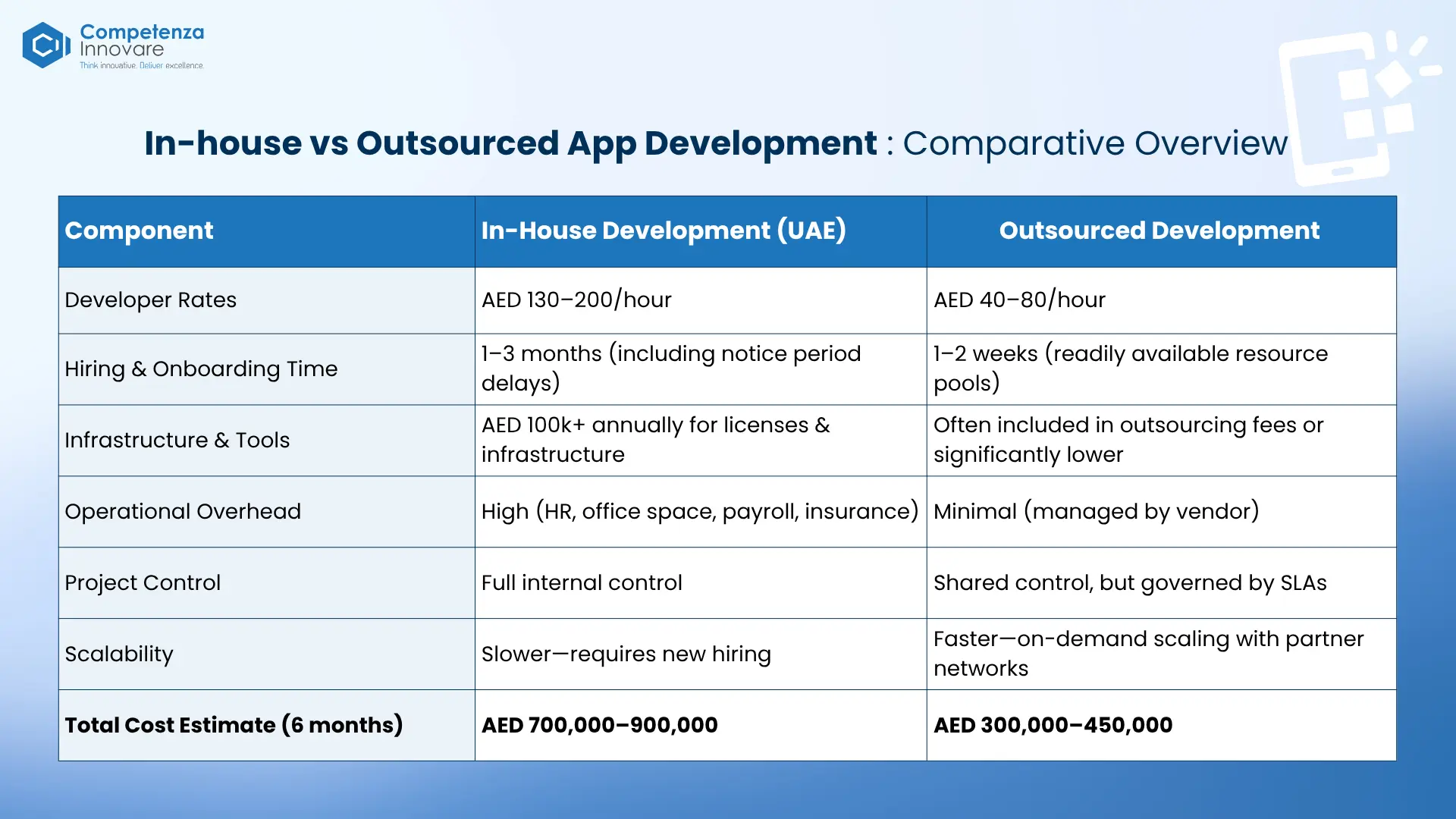
Read more on determining mobile app development costs with a complete cost breakdown and budgeting tips.
Challenges of Outsourcing App Development (& solutions we have used at Competenza)
1. Communication & Cultural Barriers:
- Establish Overlapping Work Hours: Ensure at least 3-4 hours of daily overlap between your team and the outsourced development team
- Use Collaborative Tools: Implement project management platforms (Jira, Asana), communication tools (Slack, Microsoft Teams), and video conferencing for regular check-ins
- Define Communication Protocols: Set clear expectations for response times, meeting frequencies, and escalation procedures
- Assign Dedicated Points of Contact: Designate specific team members as primary liaisons to streamline communication
2. Cultural Differences:
- Cultural Orientation: Invest time in understanding working styles and business practices of your outsourcing partner
- Flexible Scheduling: Accommodate different time zones with asynchronous communication and flexible meeting times
- Local Partnership: Consider working with outsourcing partners who have local presence or understanding of Middle East markets
- Team Integration Activities: Include outsourced team members in company meetings and cultural events when possible
3. Security and Data Privacy Risks:
- Comprehensive Legal Agreements: Use detailed NDAs, intellectual property clauses, and data protection agreements
- Secure Development Environments: Implement VPNs, encrypted communications, and secure code repositories
- Limited Access Protocols: Provide access only to necessary systems and data based on role requirements
- Regular Security Audits: Conduct security assessments and compliance checks throughout the development process
4. Risk of Losing Control Over the Project:
- Detailed Project Specifications: Create comprehensive requirements documents with clear functional and technical specifications
- Milestone-Based Development: Break projects into defined phases with specific deliverables and acceptance criteria
- Regular Progress Reviews: Conduct weekly or bi-weekly sprint reviews to assess progress and address issues early
- Change Management Processes: Establish formal procedures for handling scope changes and additional requirements
How to Outsource App Development Without Risk
- Start with a Pilot Project: Propose a short-term trial with clear deliverables to assess quality, communication, and alignment—before committing to a long-term contract.
- Request Transparent Cost Estimates: Ask for a detailed breakdown of resource costs, milestones, and contingency budgets to avoid hidden fees or cost escalations.
- Ensure IP and Code Ownership: Set up your own code repository (e.g., GitHub, Bitbucket) and define intellectual property clauses in the contract to retain full ownership from day one.
- Prioritize Data Security Measures: Use NDAs, secure repositories, and compliance with local laws (e.g., UAE’s PDPL) to protect confidential business and user data.
- Work With Escrow-Based Payment Terms: Choose partners who offer milestone-based billing or use escrow payment systems where funds are released only after deliverables meet expectations.
- Evaluate Communication and Cultural Fit: Opt for partners with timezone alignment or overlapping hours, and shared work culture norms to prevent bottlenecks and delays.
How to Select the Perfect Partner to Outsource Your App Development in the Middle East
Look for vendors who have experience working with Middle Eastern clients and understand regional business norms, languages, compliance regulations (like UAE’s PDPL), and consumer expectations—such as bilingual interfaces, mobile-first UX, and regional payment integrations.
Here is a comprehensive evaluation framework to assess potential app development partners:
1. Regional Client Portfolio:
2. Cultural Understanding:
Your outsourcing partner should demonstrate knowledge of local cultural sensitivities, religious norms, and communication etiquette that shape user experience and business interactions in the Middle East.
3. Compliance Expertise:
Check for familiarity with region-specific digital and data regulations like UAE’s Personal Data Protection Law (PDPL), Saudi Arabia’s National Cybersecurity Authority (NCA) guidelines, and industry-related compliance frameworks.
4. Localization Capabilities:
5. Payment Integration:
6. Market Knowledge:
7. Technical Assessment Areas
- Cross-Platform Expertise: Fluency in Flutter, React Native, and Xamarin to build scalable multi-platform apps efficiently.
- Native Development: Strong command of Swift/Objective-C for iOS and Kotlin/Java for Android for performance-critical native builds.
- Frontend Frameworks: Proficiency in Angular, Vue.js, and React for responsive, dynamic front-end development.
- Specialized Roles: Access to dedicated resources like- developers, UI/UX designers, DevOps engineers, QA professionals, and cybersecurity experts.
- Technology Stack Alignment: The partner’s capabilities should align with your preferred backend (Node.js, Laravel, .NET) and deployment architecture (cloud-native, microservices, etc.).
How Competenza Helps Middle East Businesses Outsource App Development Efficiently
At Competenza, we’ve helped startups and enterprises across the UAE, Saudi Arabia, and wider GCC region launch powerful mobile apps without the overheads of in-house development.
Here’s how we bring value:
- Specialized Teams: Access pre-vetted developers, designers, QA engineers, and tech leads, custom-assembled based on your app’s complexity.
- Localized Understanding: From bilingual app design to integrations with regional payment gateways (e.g., PayTabs, HyperPay), we tailor builds for GCC audiences.
- Flexible Hiring Models: Choose between dedicated resources, sprint-based contracts, or hybrid models based on your delivery roadmap.
- Transparent Delivery: Agile development cycles, weekly reporting, and collaborative project management with tools like Jira and Slack.
- End-to-End Ownership: From discovery workshops to deployment and support, we ensure you retain full control over code, data, and IP.
Explore Competenza’s Mobile App Development services or talk to our experts and discuss your mobile application development project and get a free consultation on how to approach, guidance on technology, and more when you decide to outsource your project.
Emerging Trends in App Development Outsourcing
- AI-Assisted Development: Tools like Copilot increase productivity and speed.
- Low-Code/No-Code Tools: Enable rapid iterations for MVPs and internal apps.
- Hybrid and Nearshore Models: GCC firms pair local discovery with offshore development.
- Super-App Consolidation: Fintech and retail super-apps to deepen user engagement.
- Localization Momentum: Emphasis on Arabic-first UX, RTL layouts, and regional payments (HyperPay, PayTabs).
Conclusion: Why Outsourcing App Development Works
Outsourcing app development offers a powerful way to bring your mobile product to market faster, smarter, and more affordably.
For startups and enterprises in the Middle East, it helps bypass talent shortages, reduce operational overhead, and access specific expertise while maintaining a strong focus on quality.
Whether you want to build a minimum viable product, expand your internal capacity, or scale a full-fledged digital product, outsourcing gives you flexibility and control.
With the right development partner, businesses can ensure seamless collaboration, tighter project timelines, and better cost-efficiency without compromising.
Outsourcing app development works not just because it’s cheaper, but because it aligns with how agile, tech-driven businesses need to operate in today’s competitive digital economy.
FAQs
1. How long does mobile app development typically take when outsourcing?
Timelines vary depending on app complexity, feature set, and platform choice. Simple apps may take 2–3 months, while enterprise-grade or feature-rich mobile apps can span 4–6 months or more. Outsourcing to a mobile app development company in the UAE or offshore ensures faster delivery through agile processes, expert teams, and pre-built modules.
2. What information is needed to get a detailed estimate for outsourced app development?
3. What platforms and technologies do outsourcing companies typically specialize in?
4. How do outsourcing companies handle changes in project scope?
Leading outsourcing partners follow agile development models with structured sprint cycles, backlog updates, and change request protocols. When scope changes occur, they assess timeline, cost, and impact to realign priorities. Whether you build your mobile app in the UAE or offshore, clarity in scope management is crucial to avoid cost overruns and delivery delays.
5. How do you ensure code quality and security in outsourced mobile app development?
Top mobile app development companies follow secure coding standards, implement CI/CD pipelines, conduct regular code reviews, and run both automated and manual tests. In the Middle East, compliance with UAE’s PDPL, GDPR, and cybersecurity frameworks is prioritized, especially for finance, healthcare, and eCommerce applications.

 Dista
Dista